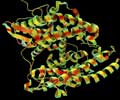Social rank and rank uncertainty predict key risk factors for poor health, specifically pro-inflammatory proteins.

‘High ranking monkeys with low certainty of their social status showed higher markers of inflammation, which can be a sign of a chronic disease state such as diabetes.’





Monkeys don't have friends lists or Instagram followers. Their social rank isn't governed by computer algorithms, but by many complex factors according to postdoctoral researcher Jessica Vandeleest and Brianne Beisner, associate project scientist in the Department of Population Health and Reproduction, UC Davis School of Veterinary Medicine and the center's Brain, Mind and Behavior Unit, who are first authors of the study. Still, the monkey model established by the UC Davis researchers could one day help doctors learn more about the way that social hierarchy affects the health of humans.
"Low social status is generally thought to lead to poorer health, yet so many exceptions undermine this apparent association that it is difficult to draw a direct relationship between status and health," Vandeleest said.
"In most studies, social status is typically represented by a simple rank order, a hierarchy where someone is 'top dog' and others rank in successively lower positions, with higher ranks getting the best and most of everything. Yet social status is more complex than just simple rank. Another, perhaps more important aspect of status is certainty of social status."
The team found that social rank and rank uncertainty predicted key risk factors for poor health, specifically pro-inflammatory proteins (C-reactive protein, interleukin-6, and tumor necrosis factor-alpha) which are risk factors for chronic diseases such as cardiovascular disease and diabetes.
Advertisement
They did this by observing how the monkeys interacted with each other - in cases where the monkeys were not interacting directly with other monkeys, their relationships were inferred through mutual social connections. The team used these indirect connections to decipher the social rank of the animals and how well they fit in the hierarchy.
Advertisement
The opposite pattern was found for low ranking monkeys - high dominance certainty was associated with higher markers of inflammation, whereas low certainty was associated with lower levels of inflammatory proteins. Monkeys that are uncertain in their low rank might have opportunities for upward mobility in the hierarchy, which may be associated with better health outcomes.
Vandeleest said the results of the study show that status uncertainty alone may be a risk factor for acute diseases. The results also indicate that uncertainty in status over longer period in relationship to rank are related to chronic disease states as well.
Source-Eurekalert









